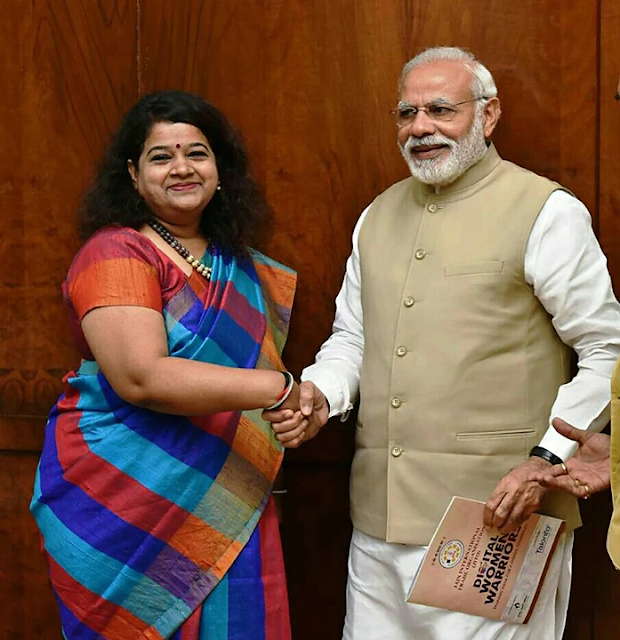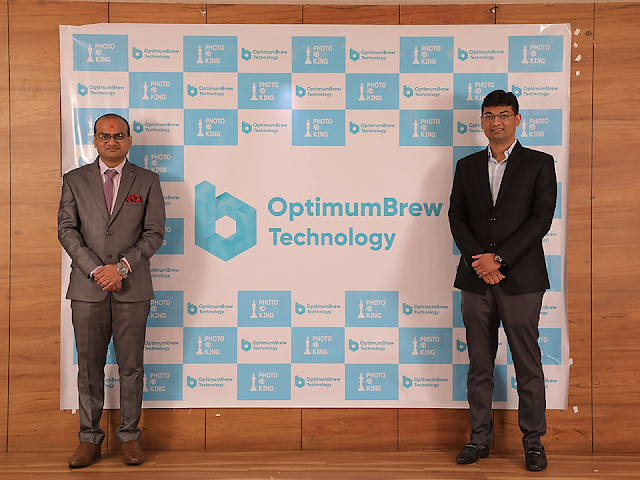Sharmila Jain Oswal's Story: An Entrepreneur cum Social Reformer for Farmers.
The Inspirational Journey of Sharmila Jain Oswal: From NGO to Millets Startup
Sharmila Jain Oswal is an accomplished entrepreneur and lawyer who has wholeheartedly committed herself to enhancing the lives of farmers and advancing sustainable agriculture practices in India. She was born and raised in Rajasthan, India, where her father operated a flour mill in a village where villagers preferred to use millet as their primary grain. After obtaining a master’s degree in environmental and agricultural law in England, she founded an NGO named the Green Energy Foundation in 2008. The foundation focuses on reviving water sources, implementing modern farming techniques, and empowering women in agriculture. Sharmila also co-founded the Millet startup ‘Gud Mom’ with her son, which sells millet-based products. Her initiatives have helped hundreds of farmers but have also been recognized and praised by India’s Prime Minister, Narendra Modi.
CONTENT
About Sharmila Jain Oswal:
 |
Take a glimpse into the entrepreneurial journey of Sharmila Jain Oswal, a Pune local who founded the Green Energy Foundation, an NGO dedicated to helping farmers restore water sources and implement innovative farming practices. Her efforts include promoting water-efficient crops like millet. Additionally, Oswal co-founded 'Gud Mom' with her son Shubham, a business that specializes in millet-based products.
The suicides of farmers disturbed her intensely:
From 2004 to 2006, there was a remarkable increase in farmer suicide rates, particularly in Maharashtra. As per NCRB data, in 2006, approximately 17,060 farmers committed suicide, of which 1,427 were from Maharashtra, and 1,065 deaths occurred in Vidarbha, the state’s cotton belt. Sharmila Jain Oswal, who settled in Canada, was disturbed upon hearing this news.
The return of Sharmila to India:
Despite earning good money, she was missing her native. So, she returned to India to support farmers and contribute to the nation's food security. Since Sharmila grew up in the village, she was aware of the inadequate situation of the farmers. However, many government initiatives were available there but failed to support them from debts and low-yielding crops.
The foundation of NGO- Green Energy Foundation:
She left her job and returned to Pune in 2008. She thoroughly studied for about two years across Maharashtra, Gujarat, and Rajasthan to understand the situation of farmers. Then, she established an NGO named the Green Energy Foundation to provide solutions to farmers. The foundation's tasks include reviving water sources, implementing modern agriculture techniques, and empowering women in agriculture.
What Sharmila learned during School Days?
During the late 1970s, Sharmila's father ran a flour mill in Poynad, a small farming village near Alibaug, Maharashtra. While villagers prefer millet as their primary ingredient. Sharmila, at an early age, understood the challenging lives of farmers and their families while growing up there. She released the importance of millet and also the concept of collaborative efforts. In the school, she released the difficulties faced by the co-students. They were from farmer families and did not have adequate income. The girls have to marry earlier to get rid of the responsibility. As a result, they were unable to access higher education. Most of the women from conservative families in Rajasthan were also backward. Due to the custom of the veil, they had to maintain isolation from the outside world. After becoming aware of the suffering and domestic violence of her classmates and relatives, Sharmila decided to become an advocate to assist women facing these kinds of problems.
“I wanted a different life than my mother, sisters, or sisters-in-law. I had witnessed my near and dear ones fall victim to domestic violence. Girls in my school were denied education and married early. So, I fought for my education,”-Sharmila.
Education and Job story of Sharmila:
Sharmila was lucky because her father and later her husband supported her in education. However, she used to be disturbed by the difficulties faced by the farming community, such as failing crops and increasing debts. She witnessed the struggles farmers face when their crops fail and droughts occur. She was eager to find solutions for their problems as the water crisis was increasing. To face these problems, Sharmila found it necessary to obtain a higher education. After marriage, Sharmila received higher training in Environmental and Agricultural Law in England. After completing her education, she worked in the UK between 1997 and 1999. Then, settled in Canada until 2007. At last, she came to her native to help the farmers.
 |
| Sharmilaji in the farm of millet. |
The activities of Sharmila Jain Oswal:
She guided them to an alternative corp from the low-yielding conventional corp. Millet was the most appropriate corp. Farmers learned to farm multiple corps for backup in case of failure. Sharmila started the NGO in 2008 in Pune with a grant of Rs 10 lakh from NABARD(National Bank for Agriculture and Rural Development). IN 2010, She commenced her first water management project at Buchkewadi, Maharashtra. This village was facing a scarcity of water, so agriculture was ruined. About 40 farmers lived in an area with only a small dam as their water source. She and her team developed a program to optimize water usage and increase availability in the village. They analyzed the soil and water and prepared a fair model for water distribution. They assisted the villagers in managing their water usage to ensure access to water, even in the summer months. The jurisdiction of the NGO of Sharmila is Maharashtra, Rajasthan, and Gujarat. In Dungarpur, Rajasthan, she inspired farmers to cultivate many crops instead of one. Because maize needs much water and fails when water is not available. She guided farmers to farm moong (green gram), which consumes less water, with the help of ITC’s e-Choupal (e-Choupal is an initiative of ITC Limited, a unique web-based page to link directly with rural farmers via the Internet for procurement of agricultural and aquaculture products). The benefit of the multiple crops is that in case of failure of any crop, the farmers always have a backup crop. Moreover, they also have support for ITC’s marketplace. NGO also assisted farmers in growing millet, which requires less water. Farmers also grow vegetables and lentils and can sustain themselves well. They need less water because of multiple crops. Insufficient farming income forced some family members to migrate to cities for more income. However, when they changed their way of farming and started growing vegetables and pulses, they could earn enough that the family could live together. Sharmila has done a great job.
 |
| Sharmilaji and happy farmer women. |
The activity of NGO- Green Energy Foundation:
Sharmila and her team have assisted over 150,000 farmers in five states over the last two decades through effective water management strategies, crop cultivation techniques, and capacity-building programs. As a result, farmers were able to generate a consistent income, making efforts highly impactful in the agricultural sector. Even before the popularity of millet, this social activist advocated for its cultivation in arid regions. Millets are a type of crop that is highly adaptable to changing climates. They have a neutral impact on carbon emissions and are environmentally friendly. Additionally, they require very little water, which makes them a sustainable option for farming and food production. Farmers can diversify their crops and conserve water by learning how to cultivate millet (such as ragi, jowar, proso, and pearl) and vegetables,- including zucchini).
How was the idea of selling millet-based products born?
When the pandemic struck, Shubham, Sharmila's son, was at home after completing his degree in political science at Ashoka University. During a conversation about the absence of healthy food choices, the idea of their startup, "Gud Mom," was born. While at the university, Shubham noticed that most of their friends were consuming junk food. Due to the consumption of unhealthy foods, a significant number of young people suffer from life-altering diseases. Shubham and his mom had taken a decisive step towards promoting healthier eating habits to students and supporting local farmers by launching a startup with a farm-to-table approach that confidently sells high-quality millet grains and nutritious snacks.
Sharmila and Shubham have established Gud Mom, a company that offers a range of delicious, healthy, and millet-based food products. 'Gud Mom' sells millet noodles, pasta, cookies, crackers, herb sticks, and more on their website, Amazon, and other retailers.
Glimpses:
- Today, the startup 'Gud Mom' has an annual revenue of over Rs 16 crore and partners with more than 5,000 millet farmers.
- 'Gud Mom' was awarded the Best Startup in Organic Farming 2021 and the 'Poshak Anaj Award 2022' by the Indian Institute of Millet Research.
- Prime Minister Narendra Modi mentioned Sharmila for increasing millet cultivation in his ‘Mann ki Baat’ program.
What Sharmila have to say?
Sharmila says- "millet should be distributed under the public distribution system (PDS). millet is a healthier option than wheat and rice, making it an ideal choice for mid-day meal schemes to promote widespread consumption.”
What Shubham have to say?
“Our goal is to build a healthy ecosystem. Nowadays, children consume too much junk food, which is not good for them. We have made a variety of appealing products from millet with international flavors and seasonings that the current generation enjoys. We want to build the immunity of the nation,”-Shubham Jain Oswal.
The crops of Millet are beneficial to the farmers as written below.
There are several reasons why farmers may prefer to grow millet over other crops.
Self-adequacy:
Millet are an ideal solution for countries aiming to increase self-sufficiency and reduce reliance on imported cereal grains. They require minimal inputs, are resistant to diseases and pests, and offer a reduced dependence on synthetic fertilizers and pesticides. Moreover, millet are more resilient to changes in climate compared to other cereals.
Enhanced livelihoods:
By diversifying the food system, Millet can help enhance livelihoods for small farmers, including women, both nationally and regionally.
The nutritional information of Millet:
Millet are considered “Nutri-cereals” due to their high nutritional content. They are rich in vitamins and minerals such as iron and calcium, high in protein, antioxidants, and resistant starch, and have a low glycemic index. These properties make millet beneficial for preventing or managing diabetes.
Environmental sustainability:
Millet require less water than rice and wheat, making them suitable for cultivation in arid lands with low rainfall regimes. They also have a low water footprint and are tolerant of heat, drought, and floods. By promoting the cultivation of Millet, farmers can contribute to sustainable agriculture practices and help conserve natural resources.



Comments